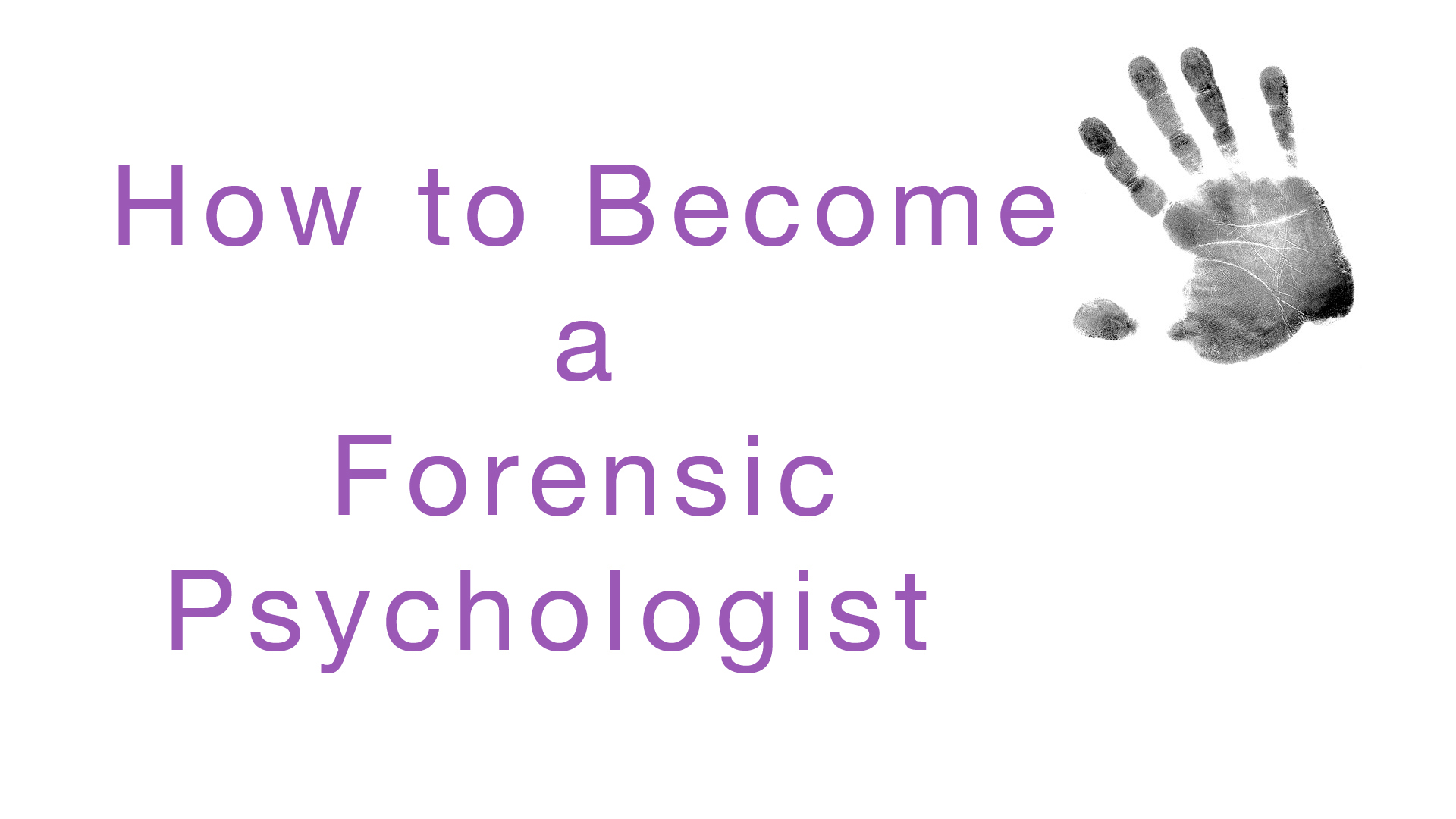How to Become an Forensic Psychologist
If you want to further research the role of a clinical psychologist then it is highly recommended that you read So, You Want to Be a Forensic Psychologist?
Forensic Psychology is a fascinating area of applied psychology. It is a phenomenally important field of study which has influenced and caused significant changes in the legal system. Research into memory has shown that eyewitness testimony is not wholly accurate and is not to be used as evidence on its own, for example: (Loftus et al., 1974, Loftus et al., 1987, Penrod and Cutler, 1995). Further examples of forensic fields of study include studying the reasons for turning to crime, how best to interview witnesses and suspects, what can cause false confessions and how to prevent them, and the psychology of the courtroom. Perhaps one of the most interesting areas of study within forensic psychology is studying how criminals think and how best to track and catch them by studying the patterns of their crimes, for example: (Hazelwood & Douglas, 1980, Canter et al., 2004, Canter & Heritage, 1990, Yochelson & Samenow, 1976).
What do Forensic Psychologists do?
Forensic psychologists are an invaluable asset for the criminal justice system. Without them, there would be many miscarriages of justice. This is because forensic psychologists work to provide expert guidance to may organisations and institutions such as the courts and the police. Forensic psychologists understand the errors that people can easily make given certain conditions, for example repetition of the same question after an answer has been given has been shown to lead people to change their answer, even when that answer was correct in the first place (Samuel & Bryant, 1984), which of course has implications for the criminal justice system, forensic psychologists will advise the police on how to best conduct interviews. In fact, forensic psychologists have proposed wholly new methods of interviewing, (Fisher et al., 1989), which yield more correct information than traditional methods of interviewing. A common role for forensic psychologists is to provide evidence as an expert witness in court – this does not mean that the expert witness was a witness to the events, but that they are an expert in areas of forensic psychology which can prove useful in that case, for example Elizabeth Loftus has been an expert witness in many cases, in these cases she informs the court and jury about the fallibility of human memory and the unreliability of eyewitness testimony.
Forensic psychologists work with organisations involved with the criminal justice system. There is a wide range of employment opportunities available for forensic psychologists. They may find employment with lawyers, social services, the home office, the police, probation services and prisons. With the probation services they provide expert advice on the risk of releasing prisoners and how they should be monitored outside of prison and how best to help them readjust to normal society, for example (Gillis & Nafekh, 2005) suggest that offender recidivism can be prevented by ensuring that the offender is occupied with meaningful employment. Within prisons they provide expert advice and work with inmates to ensure that they are coping and are being readjusted so they can better fit in with society upon being released.
Research is a large part of forensic psychology – many forensic psychologists stay within academia and pursue research and lecturing. Research is vital to the development of the field and can lead to improvements in the future within the criminal justice system. Some of the topics that forensic psychologists research include:
- Preventing offender recidivism
- Influence in the courtroom
- Methods of interviewing witnesses and suspects
- Testing the reliability of eyewitnesses
- How we can protect vulnerable people without affecting court outcomes
- Why people turn to crime and how we can prevent it
- Alternatives to imprisonment
Bare in mind that not every forensic psychologist follows this list directly. Some work in research and then work in other areas, whereas some work in both research and with local authorities and other agencies. There is always room for mapping your own career.
The Route into Forensic Psychology
The very first step in your career into educational is to complete an undergraduate psychology course that is certified by the BPS and is eligible for the ‘Graduate Basis for Chartered Membership (GBC)’.
You can search for certified undergraduate psychology courses here.
If you are completely set on becoming a forensic psychologist, then it would be better to choose a forensic psychology degree, as opposed to just a psychology one. If you are not completely sure about your final career, but you know you want to study psychology, then choose just a psychology degree, some of which have more emphasis on forensic psychology, so be sure to look at the individual units of your choose psychology or forensic psychology degree, because this can have an impact on your later career.
It would also be a good idea while you are completing your degree to look for relevant work experience, even if it is simply volunteering with a local youths or the police. Remember you should think of everything as part of the stepping stones which lead you to your desired career.
When you are searching for a university to take your forensic psychology degree at make sure that you look at the units and modules that are in that degree. For a career in forensic psychology, it would be important for you to choose a degree with modules in forensic and cognitive psychology.
Now, if you already have an undergraduate degree and it is not eligible for the ‘Graduate Basis for Chartered Membership’ then you may have to pay for a conversion course.
Ideally, you should aim for the highest degree classification as possible, because then this makes it easier for you to be accepted on to a masters course, which some employers will require.
From this point you will have to complete an forensic psychology masters degree (MSC) – these normally take between one and two years.
Following this, you will have to complete at least one year of supervised practise – this in when you will get a real taste of what forensic psychology is like.
Alternatively, if you do not get a masters and then you will need to complete a foreensic psychology doctorate level graduate training programme, which can take between three and four years to complete. There are many forensic psychology graduate programs or PhD programs out there to choose from.
On average, it will take between six and seven years to become a fully qualified and practising forensic psychologist.
Salary Expectations
Your salary will vary depending on the type of work you are doing and the organisation employing you.
Those starting out in the field should expect around £15,000 to £21,000 per annum. More experienced forensic psychologists can expect much more (depending on their employer and clients) – the higher end of the salary scale for forensic psychologists is around £60,000, but this of course will depend on your employer and how many income streams you have.
Questions to Consider
Could I deal with working with the defence in court for a person who I think is guilty?
Do I have strong people skills?
Could I work with people who are considered dangerous and unstable?
Do I like problem solving?
Am I prepared to spend 6-7 years working to become an forensic psychologist? (This is a very important question to consider).
Upon completing my degree, what else can I do if I change my mind about a forensic psychology?
What now?
One of the first things that you should do now you are considering a career in forensic psychology is to read some of the research in the field and some of the books written by forensic psychologists David Canter wrote these two books: Mapping Murder: The Secrets of Geographical Profiling and Criminal Shadows: Inside the Mind of the Serial Killer
, which are fasicinating and will help you gain a better understanding of the field and some of the work involved. You can read about forensic psychological research here: forensic psychology. If you do not want to read about them and prefer to listen, then you can listen to them here and download them for your iPod.
If you are not currently undertaking an undergraduate degree, then the first thing that you will need to do is find a university course (you can use the BPS link higher on the page to help you with this).
Try to map out a seven year plan – this plan should include:
- How you are going to support yourself when you are undertaking your degree and further training.
- Which masters or graduate training programme you want to undertake and where you want to do it – this is important because it will give you an idea of how hard you need to work during your undergraduate studies.
- What type of forensic psychology you want to do and who may employ you. It is always a good idea to contact these people ahead of time in order to see what they require and if you can get any early work experience with them.
- What is my plan B if everything goes wrong?
Forensic Psychology Masters Programmes to consider
Further Reading
So, You Want to Be a Forensic Psychologist?
Mapping Murder: The Secrets of Geographical Profiling
Criminal Shadows: Inside the Mind of the Serial Killer
Psych Yogi’s Top Ten Psychology Revision Tips for the A* Student
References
Canter and Heritage., (1990) – ‘A multivariate model of sexual offence behaviour: developments in offender profiling’, Journal of Forensic Psychiatry 1, 185-212
Hazelwood and Douglas (1980) – ‘The Lust Murderer’, FBI Law Enforcement Bulletin 49 (4), 18-22.
Loftus, E.F., Loftus, G.R., & Messo, J. (1987). Some facts about weapon focus. Law and Human Behavior, 11, 55-62.
Loftus, Elizabeth F., and John C. Palmer. “Reconstruction of automobile destruction: An example of the interaction between language and memory.”Journal of verbal learning and verbal behavior 13.5 (1974): 585-589.
Penrod and Cutler, (1995) ‘Witness Confidence and Witness Accuracy: Assessing their Forensic Relation’, Psychology, Public Policy and Law 1 (4), 817–45.
Samuel, Judith, and Peter Bryant. “Asking only one question in the conservation experiment.” Journal of Child Psychology and Psychiatry 25.2 (1984): 315-318.
Yochelson, S. and Samenow, S. (1976) – ‘A Study of Thinking Patterns in Criminals


This was a fascinating read, especially since my niece is considering forensic psychologist as one of her career paths. I have to admit that I did not know that there were so many employment options for forensic psychologists. It is really cool that they can work with lawyers, prisons, police forces, etc. and still get to work the job they want to work.